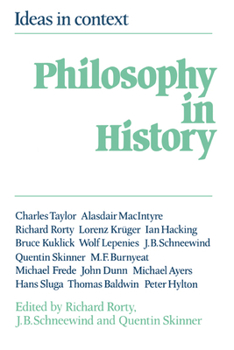Philosophy in History: Essays in the Historiography of Philosophy
(Part of the Ideas in Context Series)
Select Format
Select Condition 
Book Overview
The sixteen essays in this volume confront the current debate about the relationship between philosophy and its history. On the one hand intellectual historians commonly accuse philosophers of writing bad - anachronistic - history of philosophy, and on the other, philosophers have accused intellectual historians of writing bad - antiquarian - history of philosophy. The essays here address this controversy and ask what purpose the history of philosophy should serve. Part I contains more purely theoretical and methodological discussion, of such questions as whether there are 'timeless' philosophical problems, whether the issues of one epoch are commensurable with those of another, and what style is appropriate to the historiography of the subject. The essays in Part II consider a number of case-histories. They present important revisionist scholarship and original contributions on topics drawn from ancient, early modern and more recent philosophy. All the essays have been specially commissioned, and the contributors include many of the leading figures in the field. The volume as a whole will be of vital interest to everyone concerned with the study of philosophy and of its history.
Format:Paperback
Language:English
ISBN:B005AYTM4Q
ISBN13:9780521273305
Release Date:December 1984
Publisher:Cambridge University Press
Length:416 Pages
Weight:1.34 lbs.
Dimensions:0.9" x 6.0" x 9.0"
Customer Reviews
1 rating
Worth Owning
Published by Thriftbooks.com User , 15 years ago
The ideal audience for this book is any reader in any discipline who cares about the past and wonders how it relates to philosophy or contemporary concerns in general. Although primarily directed towards philosophers, historians of all stripes should find at least some of the articles useful and illuminating. Two of the articles, however, make the book worth owning: those by Alasdair MacIntyre and Charles Taylor. MacIntyre's article, in my view, literally solves the problem posed my acutely in Thomas Kuhn's The Structure of Scientific Revolutions: Assuming one grants the reality of incommensurability (as Kuhn and MacIntyre do, but people like Donald Davidson do not), how can one argue accross incommensurable paradigms or suggest rational progress in moving from one to another? MacIntyre answers this question, and it is difficult to see how anyone could outdo his answer. Taylor's article provides a concise statement of his view of the nature of philosophy and why it is necessarily historical (in large part because of the relationship between practices and ideas), which will be of interest to anyone keen on Taylor or who wants a concise statement of the Hegelian view of philosophy as inseparable from its history. 4 stars because the book is expensive and not all the articles are of even quality; nevertheless, most of them are of a very high quality and the book is worth having on hand if you are a historian or philosopher.






